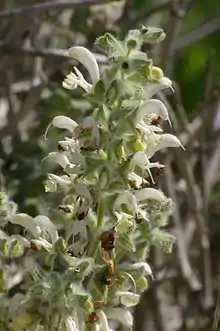Salvia dominica
Salvia dominica (Dominica sage, in Arabic ( Maru = مرو or "Khowwekha" = خويخة ), in (Hebrew: מרווה, marva) is a strong-scented perennial shrub found throughout the eastern Mediterranean, especially Jordan[1] Israel,[2] Lebanon and Syria. The branched inflorescence is one of several salvias thought to have inspired the design of the menorah. It grows to about 1 meter in height and width, and blooms in spring or early summer with pale yellow and white flowers in delicate whorls.[3]
| Salvia dominica | |
|---|---|
 | |
| Scientific classification | |
| Kingdom: | Plantae |
| Clade: | Tracheophytes |
| Clade: | Angiosperms |
| Clade: | Eudicots |
| Clade: | Asterids |
| Order: | Lamiales |
| Family: | Lamiaceae |
| Genus: | Salvia |
| Species: | S. dominica |
| Binomial name | |
| Salvia dominica | |
| Synonyms | |
|
Salvia graveolens Vahl | |
.jpg.webp)
Biological properties
A group of Italian and Jordanian researchers isolated twenty-four new sesterterpenes, some of them with interesting biological activity due to their interaction with tubulin-tyrosine ligase (TTL), an enzyme involved in the tyrosination cycle of the C-terminus of tubulin, and inhibit TTL activity in cancer cells.[4]
References
- Field Guide of Wild Flower of Jordan and Neighbouring Countries by Dawud Al-Eisawi
- Flowers in Israel
- Clebsch, Betsy; Barner, Carol D. (2003). The New Book of Salvias. Timber Press. p. 112. ISBN 978-0-88192-560-9.
- Dal Piaz F; Vassallo A; Lepore L; Tosco A; Bader A; De Tommasi N (June 2009). "Sesterterpenes as tubulin tyrosine ligase inhibitors. First insight of structure-activity relationships and discovery of new lead". J. Med. Chem. 52 (12): 3814–28. doi:10.1021/jm801637f. hdl:11563/19141. PMID 19459643.